#Umg
Text
Neither the devil you know nor the devil you don’t
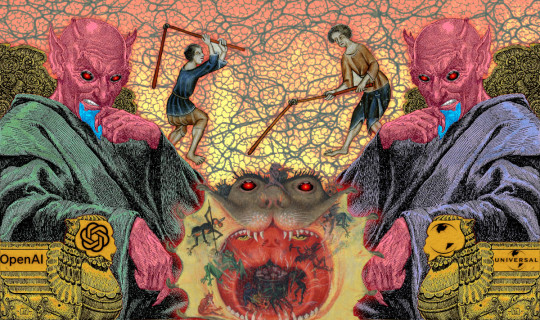
TONIGHT (June 21) I'm doing an ONLINE READING for the LOCUS AWARDS at 16hPT. On SATURDAY (June 22) I'll be in OAKLAND, CA for a panel (13hPT) and a keynote (18hPT) at the LOCUS AWARDS.

Spotify's relationship to artists can be kind of confusing. On the one hand, they pay a laughably low per-stream rate, as in homeopathic residues of a penny. On the other hand, the Big Three labels get a fortune from Spotify. And on the other other hand, it makes sense that rate for a stream heard by one person should be less than the rate for a song broadcast to thousands or millions of listeners.
But the whole thing makes sense once you understand the corporate history of Spotify. There's a whole chapter about this in Rebecca Giblin's and my 2022 book, Chokepoint Capitalism; we even made the audio for it a "Spotify exclusive" (it's the only part of the audiobook you can hear on Spotify, natch):
https://pluralistic.net/2022/09/12/streaming-doesnt-pay/#stunt-publishing
Unlike online music predecessors like Napster, Spotify sought licenses from the labels for the music it made available. This gave those labels a lot of power over Spotify, but not all the labels, just three of them. Universal, Warner and Sony, the Big Three, control more than 70% of all music recordings, and more than 60% of all music compositions. These three companies are remarkably inbred. Their execs routine hop from one to the other, and they regularly cross-license samples and other rights to each other.
The Big Three told Spotify that the price of licensing their catalogs would be high. First of all, Spotify had to give significant ownership stakes to all three labels. This put the labels in an unresolvable conflict of interest: as owners of Spotify, it was in their interests for licensing payments for music to be as low as possible. But as labels representing creative workers – musicians – it was in their interests for these payments to be as high as possible.
As it turns out, it wasn't hard to resolve that conflict after all. You see, the money the Big Three got in the form of dividends, stock sales, etc was theirs to spend as they saw fit. They could share some, all, or none of it with musicians. Big the Big Three's contracts with musicians gave those workers a guaranteed share of Spotify's licensing payments.
Accordingly, the Big Three demanded those rock-bottom per-stream rates that Spotify is notorious for. Yeah, it's true that a streaming per-listener payment should be lower than a radio per-play payment (which reaches thousands or millions of listeners), but even accounting for that, the math doesn't add up. Multiply the per-listener stream rate by the number of listeners for, say, a typical satellite radio cast, and Spotify is clearly getting a massive discount relative to other services that didn't make the Big Three into co-owners when they were kicking off.
But there's still something awry: the Big Three take in gigantic fortunes from Spotify in licensing payments. How can the per-stream rate be so low but the licensing payments be so large? And why are artists seeing so little?
Again, it's not hard to understand once you see the structure of Spotify's deal with the Big Three. The Big Three are each guaranteed a monthly minimum payment, irrespective of the number of Spotify streams from their catalog that month. So Sony might be guaranteed, say, $30m a month from Spotify, but the ultra-low per-stream rate Sony insisted on means that all the Sony streams in a typical month add up to $10m. That means that Sony still gets $30m from Spotify, but only $10m is "attributable" to a specific recording artist who can make a claim on it. The rest of the money is Sony's to play with: they can spread it around all their artists, some of their artists, or none of their artists. They can spend it on "artist development" (which might mean sending top execs on luxury junkets to big music festivals). It's theirs. The lower the per-stream rate is, the more of that minimum monthly payment is unattributable, meaning that Sony can line its pockets with it.
But these monthly minimums are just part of the goodies that the Big Three negotiated for themselves when they were designing Spotify. They also get free promo, advertising, and inclusion on Spotify's top playlists. Best (worst!) of all, the Big Three have "most favored nation" status, which means that every other label – the indies that rep the 30% of music not controlled by the Big Three – have to eat shit and take the ultra-low per-stream rate. Only those indies don't get billions in stock, they don't get monthly minimum guarantees, and they have to pay for promo, advertising, and inclusion on hot playlists.
When you understand the business mechanics of Spotify, all the contradictions resolve themselves. It is simultaneously true that Spotify pays a very low per-stream rate, that it pays the Big Three labels gigantic sums every month, and that artists are grotesquely underpaid by this system.
There are many lessons to take from this little scam, but for me, the top takeaway here is that artists are the class enemies of both Big Tech and Big Content. The Napster Wars demanded that artists ally themselves with either the tech sector or the entertainment center, nominating one or the other to be their champion.
But for a creative worker, it doesn't matter who makes a meal out of you, tech or content – all that matters is that you're being devoured.
This brings me to the debate over training AI and copyright. A lot of creative workers are justifiably angry and afraid that the AI companies want to destroy creative jobs. The CTO of Openai literally just said that onstage: "Some creative jobs maybe will go away, but maybe they shouldn’t have been there in the first place":
https://bgr.com/tech/openai-cto-thinks-ai-will-kill-some-jobs-that-shouldnt-have-existed-in-the-first-place/
Many of these workers are accordingly cheering on the entertainment industry's lawsuits over AI training. In these lawsuits, companies like the New York Times and Getty Images claim that the steps associated with training an AI model infringe copyright. This isn't a great copyright theory based on current copyright precedents, and if the suits succeed, they'll narrow fair use in ways that will impact all kinds of socially beneficial activities, like scraping the web to make the Internet Archive's Wayback Machine:
https://pluralistic.net/2024/05/13/spooky-action-at-a-close-up/#invisible-hand
But you can't make an omelet without breaking eggs, right? For some creative workers, legal uncertainty for computational linguists, search engines, and archiving projects are a small price to pay if it means keeping AI from destroying their livelihoods.
Here's the problem: establishing that AI training requires a copyright license will not stop AI from being used to erode the wages and working conditions of creative workers. The companies suing over AI training are also notorious exploiters of creative workers, union-busters and wage-stealers. They don't want to get rid of generative AI, they just want to get paid for the content used to create it. Their use-case for gen AI is the same as Openai's CTO's use-case: get rid of creative jobs and pay less for creative labor.
This isn't hypothetical. Remember last summer's actor strike? The sticking point was that the studios wanted to pay actors a single fee to scan their bodies and faces, and then use those scans instead of hiring those actors, forever, without ever paying them again. Does it matter to an actor whether the AI that replaces you at Warner, Sony, Universal, Disney or Paramount (yes, three of the Big Five studios are also the Big Three labels!) was made by Openai without paying the studios for the training material, or whether Openai paid a license fee that the studios kept?
This is true across the board. The Big Five publishers categorically refuse to include contractual language -romising not to train an LLM with the books they acquire from writers. The game studios require all their voice actors to start every recording session with an on-tape assignment of the training rights to the session:
https://pluralistic.net/2023/02/09/ai-monkeys-paw/#bullied-schoolkids
And now, with total predictability, Universal – the largest music company in the world – has announced that it will start training voice-clones with the music in its catalog:
https://www.rollingstone.com/music/music-news/umg-startsai-voice-clone-partnership-with-soundlabs-1235041808/
This comes hot on the heels of a massive blow-up between Universal and Tiktok, in which Universal professed its outrage that Tiktok was going to train voice-clones with the music Universal licensed to it. In other words: Universal's copyright claims over AI training cash out to this: "If anyone is going to profit from immiserating musicians, it's going to be us, not Tiktok."
I understand why Universal would like this idea. I just don't understand why any musician would root for Universal to defeat Tiktok, or Getty Images to trounce Stable Diffusion. Do you really think that Getty Images likes paying photographers and wants to give them a single penny more than they absolutely have to?
As we learned from George Orwell's avant-garde animated agricultural documentary Animal Farm, the problem isn't who holds the whip, the problem is the whip itself:
The creatures outside looked from pig to man, and from man to pig, and from pig to man again; but already it was impossible to say which was which.
Entertainment execs and tech execs alike are obsessed with AI because they view the future of "content" as fundamentally passive. Here's Ryan Broderick putting it better than I ever could:
At a certain audience size, you just assume those people are locked in and will consume anything you throw at them. Then it just becomes a game of lowering your production costs and increasing your prices to increase your margins. This is why executives love AI and why the average American can’t afford to eat at McDonald’s anymore.
https://www.garbageday.email/p/ceo-passive-content-obsession
Here's a rule of thumb for tech policy prescriptions. Any time you find yourself, as a worker, rooting for the same policy as your boss, you should check and make sure you're on the right side of history. The fact that creative bosses are so obsessed with making copyright cover more kinds of works, restrict more activities, lasting longer and generating higher damages should make creative workers look askance at these proposals.
After 40 years of expanded copyright, we have a creative industry that's larger and more profitable than ever, and yet the share of income going to creative workers has been in steady decline over that entire period. Every year, the share of creative income that creative workers can lay claim to declines, both proportionally and in real terms.
As with the mystery of Spotify's payments, this isn't a mystery at all. You just need to understand that when creators are stuck bargaining with a tiny, powerful cartel of movie, TV, music, publishing, streaming, games or app companies, it doesn't matter how much copyright they have to bargain with. Giving a creative worker more copyright is like giving a bullied schoolkid more lunch-money. There's no amount of money that will satisfy the bullies and leave enough left over for the kid to buy lunch. They just take everything.
Telling creative workers that they can solve their declining wages with more copyright is a denial that creative workers are workers at all. It treats us as entrepreneurial small businesses, LLCs with MFAs negotiating B2B with other companies. That's how we lose.
On the other hand, if we address the problems of AI and labor as workers, and insist on labor rights – like the Writers Guild did when it struck last summer – then we ally ourselves with every other worker whose wages and working conditions are being attacked with AI:
https://pluralistic.net/2023/10/01/how-the-writers-guild-sunk-ais-ship/
Our path to better working conditions lies through organizing and striking, not through helping our bosses sue other giant mulitnational corporations for the right to bleed us out.
The US Copyright Office has repeatedly stated that AI-generated works don't qualify for copyrights, meaning everything AI generated can be freely copied and distributed and the companies that make them can't stop them. This is fantastic news, because the only thing our bosses hate more than paying us is not being able to stop other people from copying the things we make for them. We should be shouting this from the rooftops, not demanding more copyright for AI.
Here's a thing: FTC chair Lina Khan recently told an audience that she was thinking of using her Section 5 powers (to regulate "unfair and deceptive" conduct) to go after AI training:
https://www.youtube.com/watch?v=3mh8Z5pcJpg
Khan has already used these Section 5 powers to secure labor rights, for example, by banning noncompetes:
https://pluralistic.net/2024/04/25/capri-v-tapestry/#aiming-at-dollars-not-men
Creative workers should be banding together with other labor advocates to propose ways for the FTC to prevent all AI-based labor exploitation, like the "reverse-centaur" arrangement in which a human serves as an AI's body, working at breakneck pace until they are psychologically and physically ruined:
https://pluralistic.net/2022/04/17/revenge-of-the-chickenized-reverse-centaurs/
As workers standing with other workers, we can demand the things that help us, even (especially) when that means less for our bosses. On the other hand, if we confine ourselves to backing our bosses' plays, we only stand to gain whatever crumbs they choose to drop at their feet for us.

If you'd like an essay-formatted version of this post to read or share, here's a link to it on pluralistic.net, my surveillance-free, ad-free, tracker-free blog:
https://pluralistic.net/2024/06/21/off-the-menu/#universally-loathed

Support me this summer on the Clarion Write-A-Thon and help raise money for the Clarion Science Fiction and Fantasy Writers' Workshop!

Image:
Cryteria (modified)
https://commons.wikimedia.org/wiki/File:HAL9000.svg
CC BY 3.0
https://creativecommons.org/licenses/by/3.0/deed.en
#pluralistic#openai#ai#llms#gai#generative ai#models#music#umg#universal music group#spotify#tiktok#creative labor markets#chokepoint capitalism.#copyfight
305 notes
·
View notes
Text


Universal Music Group artists will soon have the ability to tease unreleased music on Spotify, Billboard reports.
Taylor Swift is one of the UMG artists that will be able to have access to this feature!
331 notes
·
View notes
Text
Final Thoughts on The Trainee! (TL;DR That Last 4/4 Quarter Was a Major Fumble, But It Didn't Ruin the Whole Show For Me)
I had promised my friends @lurkingshan and @shortpplfedup that I honestly wouldn't write too much about The Trainee while it was airing, because I was mad sus about the crew of this show. Many of the crew of The Trainee had worked on an ill-fated GMMTV het drama called UMG, which aired last year, and which starred Nanon Korapat, Namtan Tipnaree, and Milk Pansa in an unfortunate, chemistry-devoid love triangle. It was a flop and I never finished it.
I had thought to think about where this crew came from about four episodes into The Trainee, when I realized that the MO of this series was to center not Ryan's and Jane's budding romance, but the inner workings of an office, and the infrastructures of making filmed content instead.
UMG was framed in a similar way. While the show struggled to contextualize romance among its characters, the center of each episode was actually about describing concepts regarding extraterrestrial life -- things like crop circles and whatever. (There were aliens in this show.) (Dammit, I can't find a gif of the aliens!) (Here's Milk with some boogie eyes instead, whatever.)

As @lurkingshan wrote often during her watch of the series, The Trainee was ultimately a workplace BL, and I'd add to that that it was meant to serve as an educational series to GMMTV's unique audience. I wondered, early on in The Trainee, if I was just too damn old, as a working professional, to be an audience to this show. GMMTV's audience, of course, skews Gen Z and maybe very-late millennial -- GMMTV's shows are equivalent to shows airing on MTV or The CW by way of its majority audience market.
I certainly had a lot of experience by way of how interpersonal relationships mostly played out in this series (although I reeeeeally needed Judy to acknowledge her kissing Ba-Mhee and to talk about it, the way Jane acknowledged the power gap between him and Ryan after they started dating).
But, honestly? I ended up LOVING the breakdowns of how creating filmed content works, especially in regards to how viscerally and intensely these concepts were depicted.
And The Trainee stepped into some other territory, y'all! Many of us had intense discussions regarding bisexual inclusion and erasure once Tae and Ba-Mhee got back together. These concepts are sophisticated and important to ruminate on -- again, especially for a younger audience being fed most binary male-male and female-female queer media and concepts by a giant like GMMTV, which makes a ton of money on branding same-sex actors together. Queerness has a lot of spectrums, and bi inclusion was something I was glad this series unexpectedly took on.
So, against all this good stuff, that last 4/4 quarter sucked. I felt terrible for Ryan's 20-something hormones. Jane went to get a masters', and didn't even *call* his.... his boo? (Ryan wasn't Jane's boyfriend, obviously, maybe we could call Ryan his crush, his boo-boo, whatever.) Like. Jane didn't even come back to Thailand to visit, ever? Come awn now. If a show is feeding realism to a young audience by way of how corporate workplaces work, and how the art of an industry is made, at least please make the final romance a little more realistic!
(All y'all 20-somethings who were watching this show and wondering if you should wait five years for a potential boo to come back from overseas, please listen to your auntie here, GO DATE OTHER PEOPLE. Don't be like Ryan. Focus on *YOUR* NEEDS. This has been your reality-based PSA.)
But the rest of the finale was lovely for me. Jo, to me, was a realistic boss. He had a priority in keeping on Jane as an assistant director, because Jane was a great assistant director, and served well in that role, which served well for Jo's company. When Jane expressed an interest in growing, Jo knew that Jane couldn't do it in Jo's shadow -- and Jo said so. Jane taking a risk to LEAVE is a kind of risk I've had to confront time and time again in my own career, as I grew out of a workplace, and grew out of what that workplace was demanding of me. It's a wonderful notion for young people to contemplate on -- that movement in one's career must be first and foremost driven by the individual themself, for the sake of their own accountability to their growth.
I was thrilled to see Sea Tawinan in them white pants Ba-Mhee and Tae's engagement, Tae setting guardrails for himself to focus more on Ba-Mhee, and omg Pie's and Ba-Mhee's breakdown had me howling. Poon's a new fave as well. The Trainee confirmed my continued deep love and appreciation for Piploy, I think she's cute and great-great.

I truly enjoyed this show. The crew ultimately de-centralized romance for most of the show to focus on how work lives and personal lives realistically intertwine. We are the same people at work as we are at home, with all of the messiness we bring to those tables, including unrecommended romances that may traverse age and power gaps. Things can get messy, but I think, other than the whole Judy thing and Jane ghosting Ryan for years (wtf man), The Trainee handled that messiness with empathy for the young people who did a lot of growing up during the course of this series.
#the trainee#the trainee the series#offgun#off jumpol#gun atthaphan#ryanjane#ryan x jane#jane x ryan#umg#umg the series#sea tawinan#piploy kanyarat#view benyapa#poon mitpakdee
37 notes
·
View notes
Text
(Alleged info!, but:) This is getting messier by the day
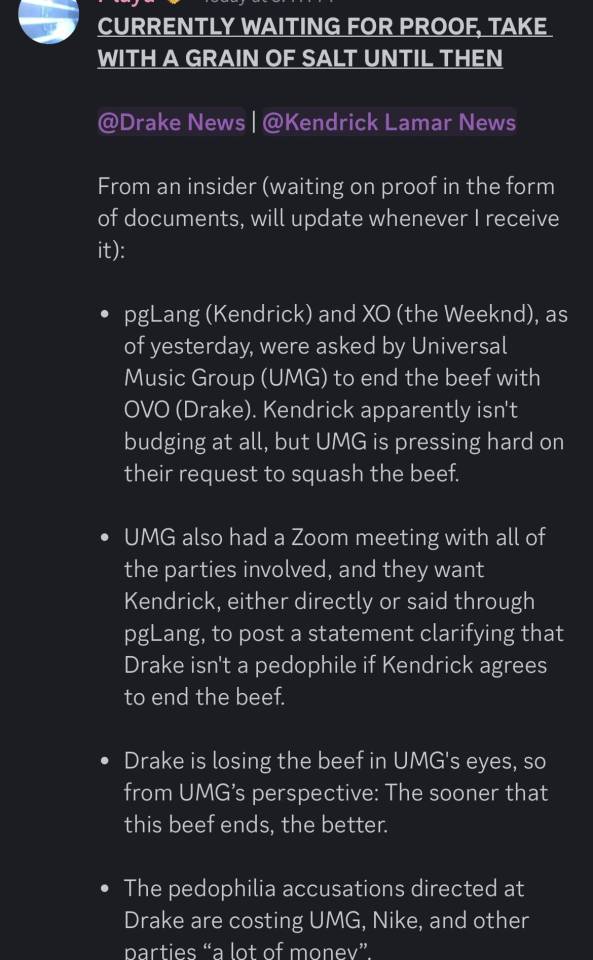
Link here:
https://x.com/yandhiisntreal/status/1787935103877865475?t=OKgD86Cp0dhzqHwsvwQQqw&s=08
"How obviously do you want to support Drake, his (at times illegal, but definitely just frowned upon) behavior?"
UMG: yes sir.
This is disgusting. Because not only is it clear they only care about money (surprise surprise) but the fact they choose to defend Drake over money when these allegations have been around for years is wild.
Back when they first surfaced, no one "cared", they didn't lose any money and that's why they didn't intervene.
Look at how the turntables, as soon as there's a mob of angry people actually hating what Drake's been doing and the fact he's been getting away with it.
I sure hope this isn't true, but we all know what the industry is like.
#kendrick lamar#drake diss#hiphop#Umg#Ovo#Xo#pglang#beef#Yall defending him smh#Money crazy world#Industry#Fuck this shit#Messy as hell
58 notes
·
View notes
Text

#tv shows#tv series#polls#umg#nanon korapat#namtan tipnaree#milk pansa#2020s series#thai series#have you seen this series poll
38 notes
·
View notes
Text
[“Listen kid, don’t mind me, i’m just frolicking in the fields.”]

#artists on tumblr#art#undertale#undertale au#sans#alternate universe#doodle#digital art#sketch#meme#sans shitpost#shitpost#umg#utmv sans#utmv fanart#utmv au#ut#utmv oc
20 notes
·
View notes
Text
UMG is pulling their artist catalog from TikTok after failed contract negotiations
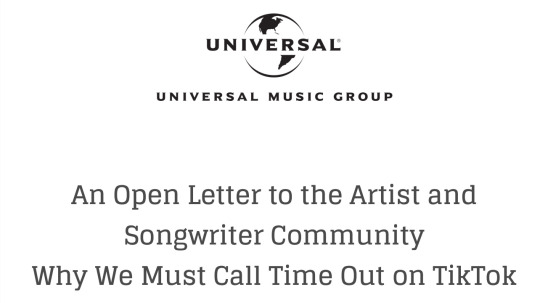
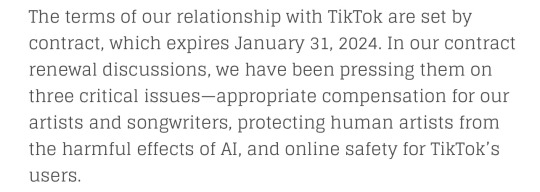
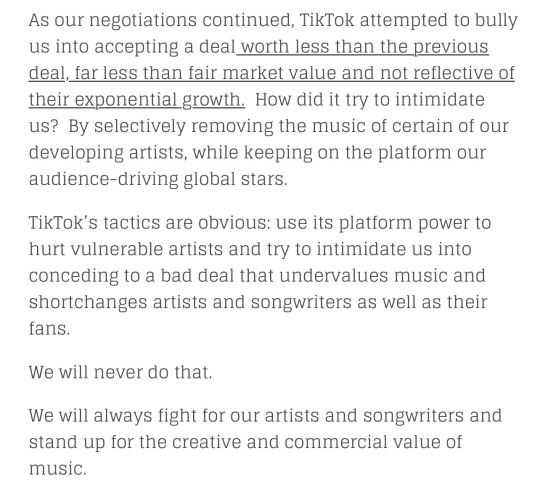
READ THE FULL ARTICLE HERE
This could potentially mean no (new) Zayn, Niall or Liam as they’re all signed under the UMG umbrella.
#UMG#record labels#music industry#TikTok#zayn’s label#Niall’s label#Liam’s label#universal music group#universal music#Zayn Malik#Zayn#Niall Horan#Liam Payne#UMG vs tiktok
58 notes
·
View notes
Photo





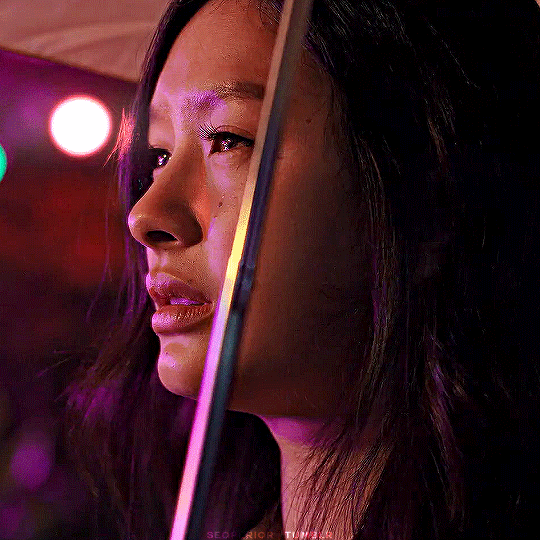
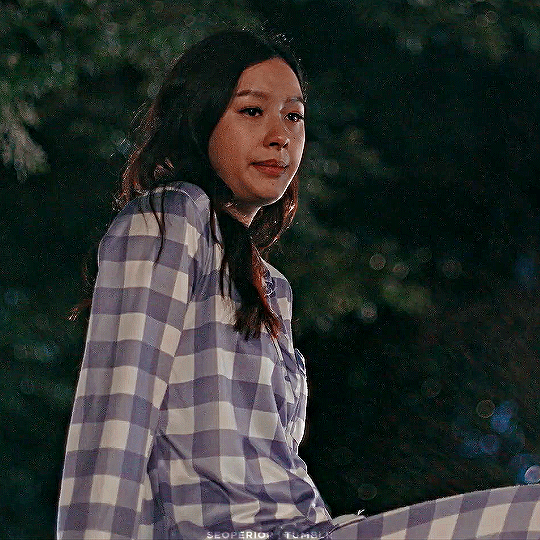


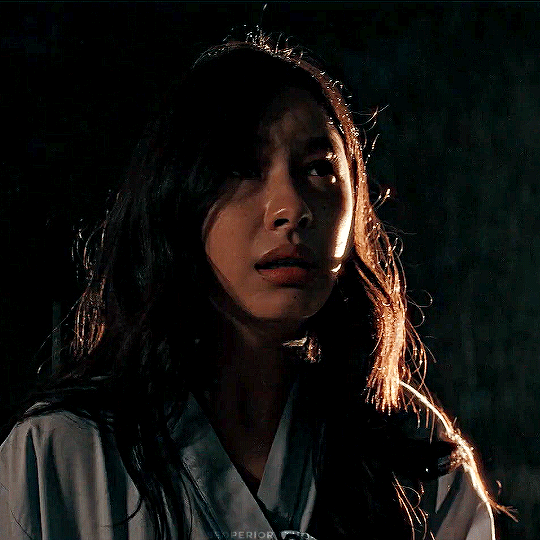
MILK PANSA as ERNG
U.M.G. (Unidentified Mysterious Girlfriend) Official Trailer
#unidentified mysterious girlfriend#umg series#milk pansa#lakornladies#userkit#nellsdani#ninisdarlings#mine#i don't like how this looks bc it's too grainy for my liking....#and i am too lazy to find a way round that 🤷🏼♀️#so i'm sorry you have no choice but to see this#BUT ANYWAY ACTRESS MILK PANSA IS BACCCKKKK#ERNG MY BABY I WILL PROTECT YOU FROM EVERYTHING#FORGET ABOUT MEW I AM HERE FOR YOU#(one thing tho: kinda sad erng seems softer now vs the mock trailer)#((kinda like her evil vibes on the mock trailer))#umgedit#umg
369 notes
·
View notes
Text
I had to watch the trailer for The Trainee several time because the first time I. could. not. concentrate. I was trying to read slogans on shirts left right and centre, seeing clothes already on the communal wardrobe list, and then getting hit by NEW ONES 😍
Communal wardrobe items spotted so far: 3
1. Today is: Totally not my day.
Worn also in UMG and Only Friends.



2. Good, Good! Times, Times! (Alright, "Good, Times, Good! Times!")
Worn also in Cutie Pie 2 You.


3. Nick's Sweater
Worn also in Only Friends.


Anyway...I'm looking forward to this one, not least because I'd happily watch Gun and Off fall in love with each other a million times over, but I'm loving the supporting cast too.
How I'm feeling now (and an absolutely brilliant addition to the t-shirt slogan collection):

#ahhh!#the trainee#the trainee the series#gunoff#offgun#the thai communal wardrobe#the is for me and the five other people who get excited over shared items#umg#unidentified mysterious girlfriend#only friends the series#ofts#cutie pie 2 you
27 notes
·
View notes
Text
describing my favorite characters like
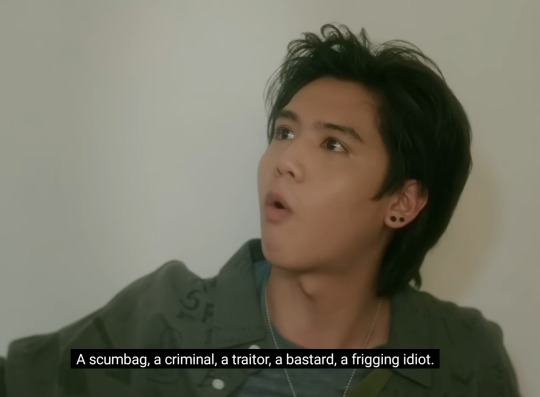
#umg: unidentified mysterious girlfriend#umg the series#umg#unidentified mysterious girlfriend#sing harit
284 notes
·
View notes
Text
progress of gmmtv 2023 series
aired:
midnight museum
a boss and a babe
double savage
umg
our skyy 2
loneliness society
enigma
home school
be my favorite
the jungle
hidden agenda
only friends
dangerous romance
wednesday club
faceless love
last twilight
cooking crush
find yourself
cherry magic
beauty newbie
23.5
the interest (love you to debt)
currently airing:
a love so beautiful
updated: 14/06/2024
#gmmtv 2023#midnight museum#a boss and a babe#umg#double savage#our skyy 2#the jungle#loneliness society#only friends#23.5#dangerous romance#cooking crush#find yourself#enigma#hidden agenda#phro thoe khue rak raek#last twilight#faceless love#cherry magic#beauty newbie#wednesday club#be my favorite#home school#also I do not follow certain entire casts so I might have missed some shows starting productions#if you know other info please tell me I'll edit this post#be my favorite will air after abaab for sure#loneliness society & the jungle will likely air after our skyy & double savage but idk which one after which#in any case I can't wait for the jungle#and I'm praying every day for cooking crush to start production soon 🥺
275 notes
·
View notes
Text

Drakes record company want Kendrick to stop the beef and say that Drake isn’t a pedophile 😮
26 notes
·
View notes
Text

Taylor's music has now returned to TikTok!
— She is the only UMG Artist that has her music returned so far.
173 notes
·
View notes
Text
I HATE the transition phase between ending shows and premiering shows. It’s just 1-2 weeks of grieving the loss of your current emotional support characters that you’ve bonded to over past three months before you’ll even get to meet the next round of potential emotional support characters.
#what if the new ones don’t live up???#my school president#the warp effect#never let me go#moonlight chicken#a boss and a babe#midnight museum#umg#gmmtv series#thai series#thai bl series
250 notes
·
View notes
Text
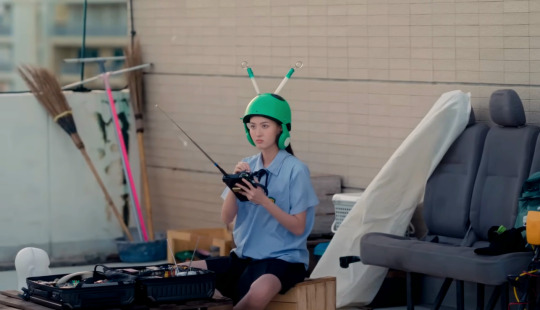

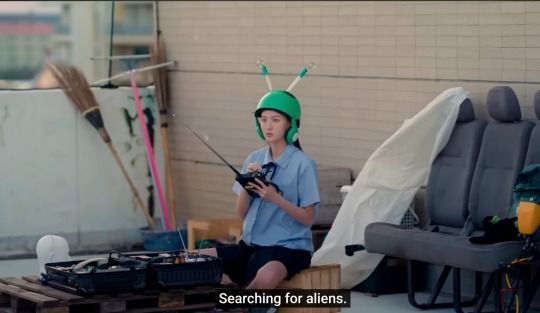
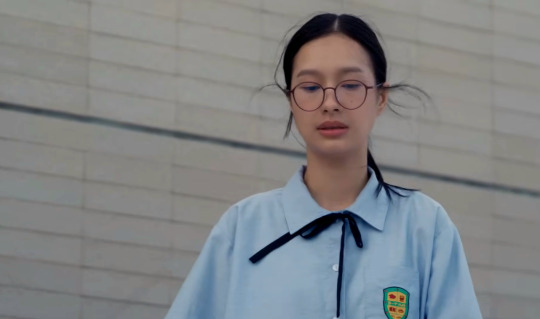
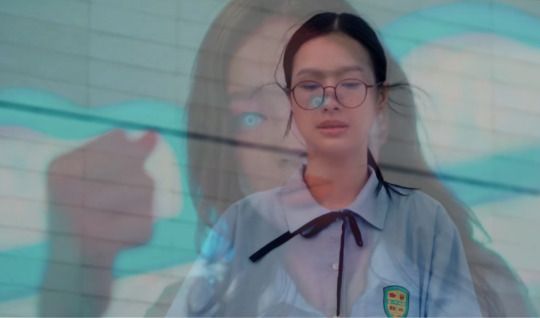
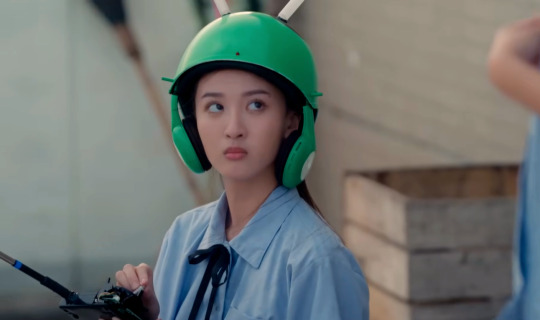


in any lifetime, i'd find you (👽 girl)
#23.5#23.5 the series#23.5 degrees#but also: propaganda enters a new age for#umg#liomsa#liomsa: 23.5#liomsa: umg#liomsa: memery
31 notes
·
View notes
Photo

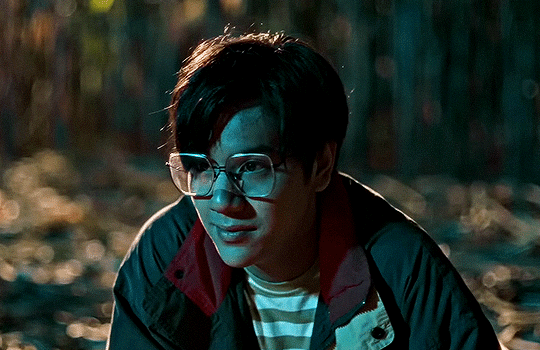
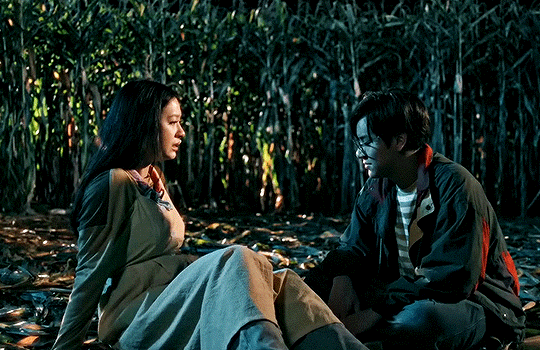

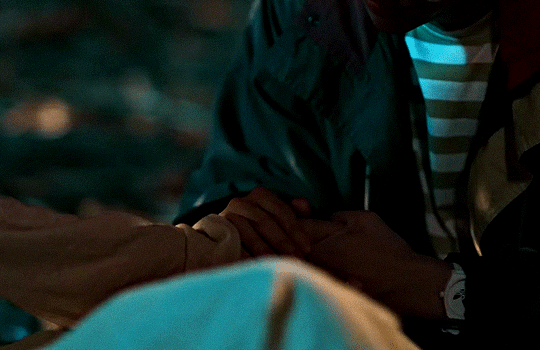
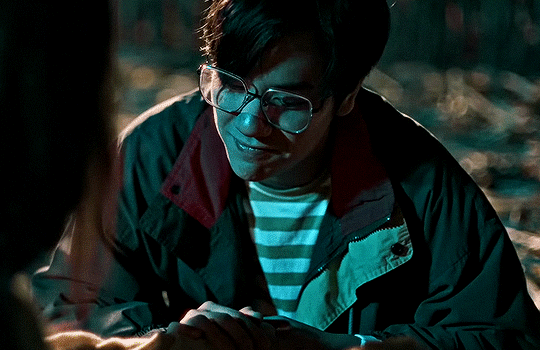

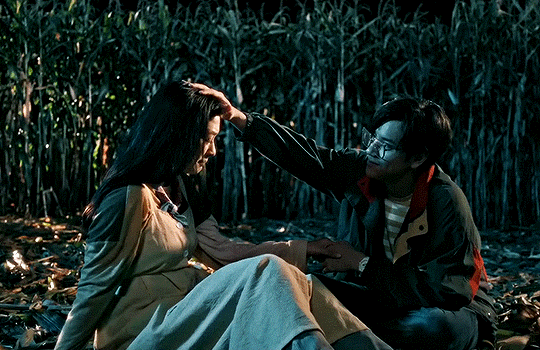
I’m scared of myself.
157 notes
·
View notes